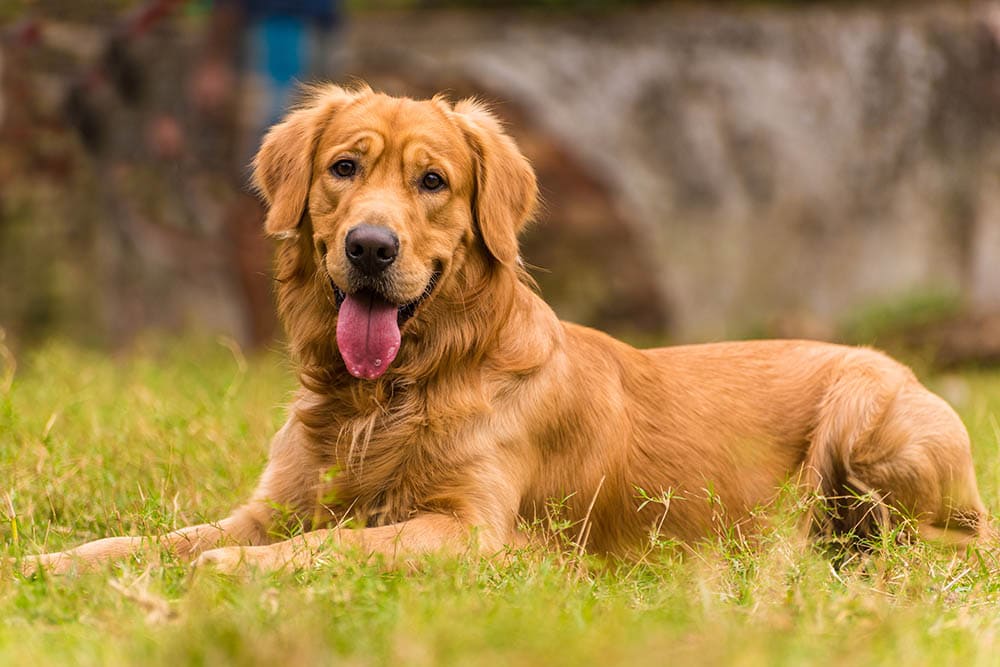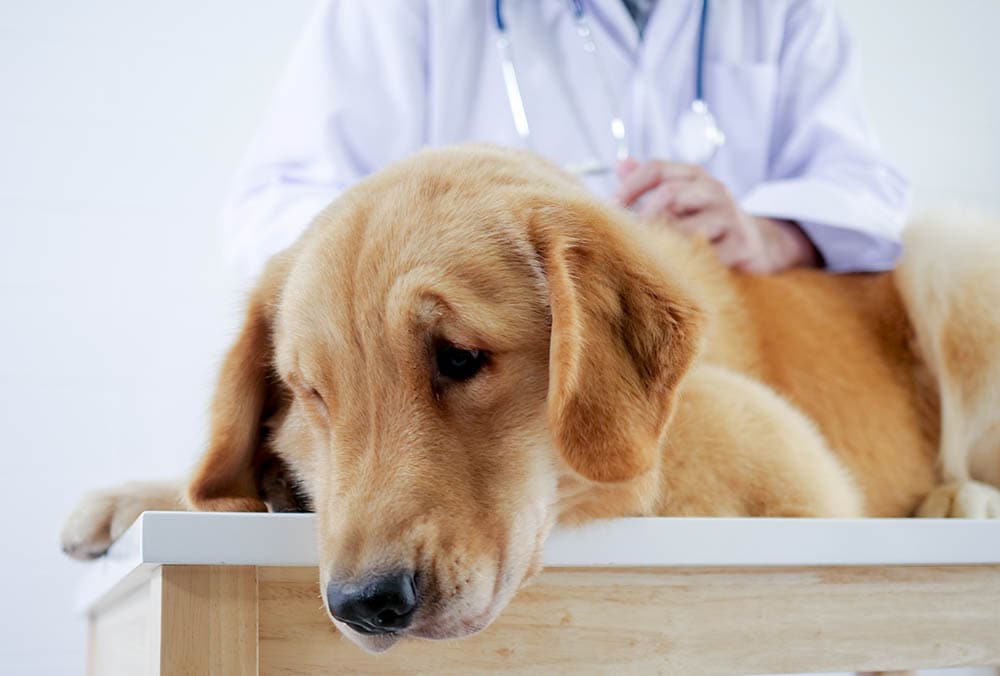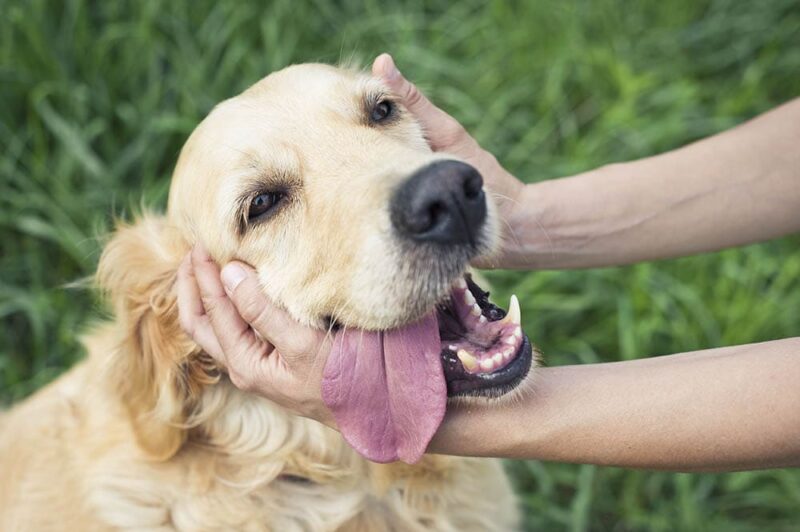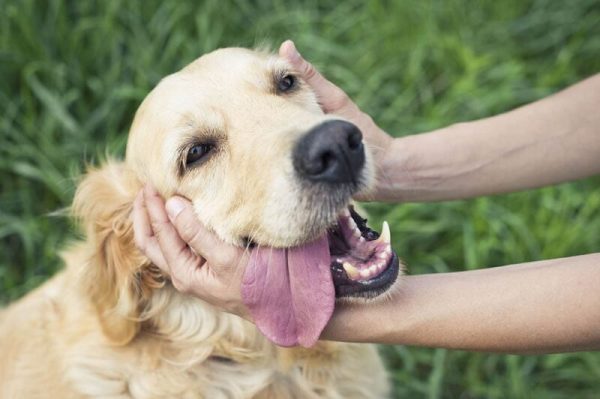It’s normal for dog breeds with drooping jowls—such as Bloodhounds, Saint Bernards, and Mastiffs—to drool a lot. But, excessive drooling, medically known as ptyalism, is not always normal for Golden Retrievers. Sometimes, it’s a sign that something’s wrong.
Not all excessive drooling is a cause for concern. Like all dogs, goldies drool in anticipation of food. In this article, we’ll take a look at when drooling is normal, and what excessive drooling might mean.
Why Do Dogs Drool?
All dogs, including Golden Retrievers, drool for much the same reason as humans do. When they smell food, anticipate a meal, or even at the sight of tasty treats, their glands release saliva into their mouth, to help them digest food.
A delicious meal will get a Golden Retriever’s mouth watering more than usual. Coincidentally, the same reaction can happen for unpleasant-tasting foods or items, for example, some medication.

The 7 Causes of Excessive Drooling in Golden Retrievers
What if your Golden Retriever drools excessively outside of meal times? Several issues may stop your dog from swallowing properly, leading to a buildup of saliva in their mouth and other conditions that may cause excess production of saliva.
1. Teeth and Gums
A number of dental and oral issues could cause your Golden Retriever to drool excessively. It could be due to a bone or other foreign object stuck between their teeth or in their throat. In this case, it’s their body’s natural reaction to having an uncomfortable item lodged inside their mouth.
Fractured teeth, tartar, and irritated gums, amongst other oral issues, can lead to excessive drooling too. Other symptoms of dental issues include reduced appetite, whining, and pawing at the mouth. Your dog’s drool might even contain a small amount of blood mixed in. Check their mouth for red, swollen gums, and look out for brown spots on their teeth.
If you suspect there’s an issue with their teeth or gums, it’s best to take your goldie to a vet for a proper check-up. Swift action can prevent more serious problems like major trauma, infections, or teeth loss.

2. Toxins and Digestive Issues
If your dog has ingested something poisonous, be it a plant in the garden, an insecticide, or nicotine, their body will react to the toxic substance. If poisoning is the cause of excess drooling, it will normally be accompanied by other signs such as nausea, vomiting, shaking, or wobbliness, among others.
Nausea can also cause your Goldie to drool excessively, along with lip-smacking and a refusal to eat. Other digestive issues, such as bloat, may be the culprit. In the case of bloat, it is always a potentially life-threatening condition, so it’s important to act fast. If you think poisoning or bloat is the cause of your dog’s excessive drooling, you should call a vet as soon as possible.
3. Heatstroke
When it comes to regulating their body temperature, dogs don’t have sweat glands as we do. On hot days, you’ll notice your Golden Retriever opening their mouth wide and panting. Along with plenty of water and shade, this should be enough to cool your dog down.
However, excessive drooling on particularly hot days may be a sign of your dog overheating. Make sure they have access to drinking water and do not take them on long walks in the sun. Remember to offer them plenty of shade, and preferably a nice pool or river for them to dip in.
4. Anxiety
Excessive drooling could be a sign that your Golden Retriever is anxious about something. New situations, thunderstorms, and fireworks can all lead to your Golden Retriever feeling anxious.
5. Idiopathic Trigeminal Neuritis
This illness can affect any breed, but Golden Retrievers seem to be more susceptible. This condition affects the trigeminal nerves on each side of the head, making the dog unable to close their mouth (dropped jaw). The main symptoms are difficulty in eating and drinking and excessive drooling.

6. Oral Tumors
Tumors in the mouth or throat can cause excessive drooling in dogs. Sometimes, the drool might be blood-tinged or can be foul-smelling. A dog with a tumor may have bad breath. Other symptoms include difficulty eating, drinking, and swallowing.
If your dog is finding it difficult to swallow, it’s strongly advised that you take them to see a vet.
7. Other Problems
There are a large number of other conditions that can cause Golden Retrievers to drool excessively. For example, neuromuscular conditions (e.g., botulism and paralysis), rabies, liver disease, and ear, nose, and throat infections can all be causes of excessive drooling.
While some of these conditions are easier to solve with vet-prescribed medication, others are more serious and need a good care plan.
Wrapping Up
It’s not normal for a Golden Retriever to drool excessively. If there’s no sign of food, excessive drooling in Golden Retrievers usually points to an underlying issue. While some issues—like a small amount of food stuck between their teeth—are easy to solve, others could be potentially life-threatening.
If your dog has suddenly started to drool excessively, look for other signs and symptoms. Loss of appetite, lethargy, shaking, vomiting, and whining are all signs that require swift action. In the end, you know what’s normal for your dog, and if they are acting in a way that’s concerning, it’s definitely best to take them to see a vet.
Related Read:
- Why Does My Golden Retriever Pant So Much? Should I Worry?
- How Much Should I Feed My Golden Retriever Puppy?
Featured Image Credit: archimede, Shutterstock












